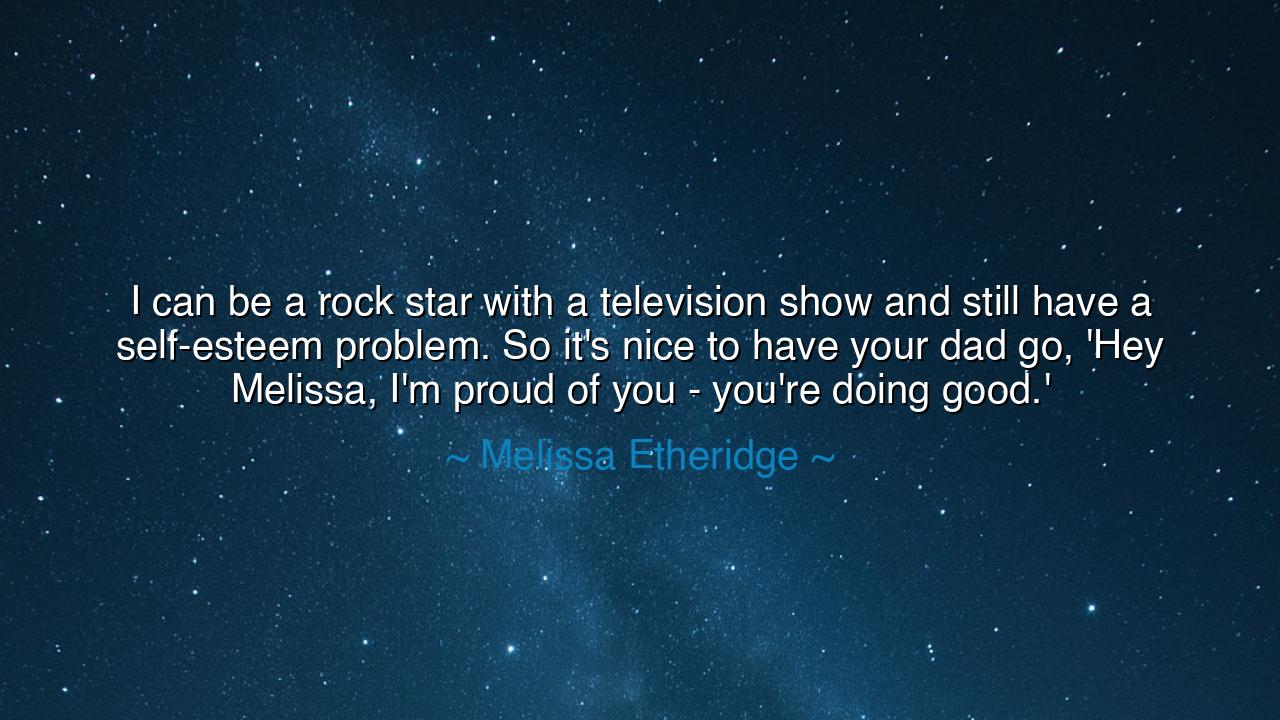
I can be a rock star with a television show and still have a
I can be a rock star with a television show and still have a self-esteem problem. So it's nice to have your dad go, 'Hey Melissa, I'm proud of you - you're doing good.'






When Melissa Etheridge said, “I can be a rock star with a television show and still have a self-esteem problem. So it’s nice to have your dad go, ‘Hey Melissa, I’m proud of you — you’re doing good,’” she revealed a truth as ancient as the human heart itself — that recognition, even amidst success, is a need that no amount of fame can replace. Her words speak to the quiet, enduring power of love and validation, especially that which flows from the bond between parent and child. Beneath the surface of celebrity and applause lies a simple yearning: to be seen, not by the world, but by those whose love shaped us before the world ever knew our name.
The origin of this quote comes from a deeply personal place — a moment of honesty from an artist who had reached the heights of fame, yet still felt the tender ache of vulnerability. Etheridge, known for her raw voice and fearless authenticity, understood that success does not silence the inner critic. In her words, we hear the wisdom of someone who has looked beyond the illusions of glory and found that the human soul, no matter how accomplished, still seeks affirmation. The ancients would have understood this perfectly. They taught that the external crown means little without inner peace, and that a heart deprived of affection remains restless, no matter how radiant its outward achievements.
This truth was known even to kings and heroes. Consider Alexander the Great, who conquered vast lands and built an empire stretching from Greece to India. Yet after his victories, he longed not only for triumph but for approval — for the blessing of his teacher Aristotle, and the shadowed memory of his father, King Philip of Macedon. His empire could not fill the space left by that longing. So it is with Etheridge: though the world may cheer her music and her courage, the soft words of a father saying, “I’m proud of you,” carry a weight that no stadium roar can equal. For in that moment, she is not the rock star, but the daughter — seen, known, and loved.
Her reflection also uncovers the illusion of success that often deceives the modern soul. In a world that glorifies achievement and visibility, many believe that fame will cure their doubts, that wealth will silence their pain. Yet, as Etheridge reminds us, the human spirit remains tender and fragile beneath the armor of accomplishment. The applause of strangers can never equal the affirmation of love. Self-esteem is not a prize won through status; it is a seed that grows through connection, humility, and truth. To receive words of pride from a loved one is not vanity — it is nourishment, a reminder that we are more than our achievements, that we are valued simply for who we are.
This lesson resounds through history. The great Michelangelo, sculptor of the divine, created masterpieces that made popes and princes bow in awe. Yet even he, in his letters, spoke of loneliness and longing for affection, for the simple warmth of being appreciated as a man, not merely as a master. His art elevated him to immortality, but his humanity still sought recognition from those who knew his heart. Like Etheridge, he reminds us that no height of genius exempts us from the need to be loved — to hear, even once, “You have done well.”
Etheridge’s quote, though personal, offers a universal call to humility and compassion. It teaches that every soul, no matter how accomplished, carries unseen wounds of doubt. Therefore, we must learn to give what we also crave — to tell others, “I see you, and I am proud of you.” The power of these simple words can heal what years of striving cannot. They bridge the distance between hearts and remind us that worth is shared, not earned. The ancients taught that love is the root of all virtue, and in Etheridge’s story, we see how love restores balance to the weary spirit.
So, my listener, take this wisdom to heart: never believe that success alone will quiet the soul’s hunger. Seek not only greatness in the eyes of the world, but gentleness in your own heart. Be generous with your praise, for you do not know what battles others are fighting behind their smiles. Tell your loved ones that you are proud of them; speak words of encouragement freely, for they may carry more power than you can imagine.
For in the end, as Etheridge’s words remind us, fame fades, but love endures. The applause will one day fall silent, the lights will dim, and all that will remain are the voices of those who loved us from the beginning — those who knew our name before it was ever sung. Cherish them, honor them, and let them know that their pride in you is your greatest treasure. For that simple blessing — “You’re doing good” — is not only comfort; it is the proof that, beyond the stage of the world, we are home.






AAdministratorAdministrator
Welcome, honored guests. Please leave a comment, we will respond soon